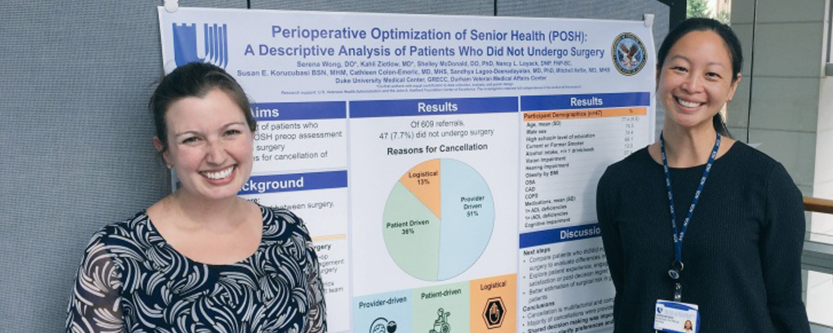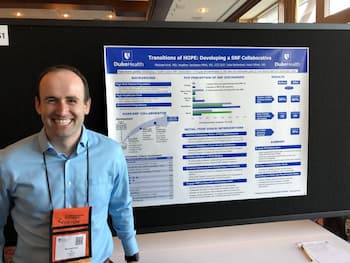
We are proud to offer opportunities for fellows to pursue additional training and development in preparation for careers in academic geriatrics through our advanced fellowship. Fellows selected to stay for advanced training may pursue a Research Track or a Geriatrics Education and Leadership Track.

This is a 2–3-year track (1 year geriatric medicine + 1-2 aging research) for individuals who wish to pursue a career in aging research. Graduates of this program are strong candidates for research career development awards from the National Institutes of Health, VA, and other funding agencies.
During the first year of geriatric medicine fellowship, early identification of research mentors is facilitated, and fellows have dedicated academic time to participate in research teams and begin project(s).
In the subsequent year(s), fellows have over 80% time protected for research training and projects tailored to their goals.
Research Track fellows receive support for professional development, including earning advanced degrees, in their area of interest. Options include:
- Clinical research training from the Duke Clinical Research Training Program Master’s Degree curriculum
- Basic (geroscience) and translational research training from
- the CRTP Basic Science Research Track
- and the Duke Pepper Center
- Health services research training from the Durham VA ADAPT Center research fellowship program
- Social science or biobehavioral research training from
- Population health science, epidemiology, and implementation science training from the Masters in Population Health Science program
This is a 2-3 year track (1 year Geriatric Medicine + 1-2 years advanced fellowship) for individuals who wish to pursue careers as clinician-educators, health system leaders, medical directors, or scholars improving healthcare delivery.
During the first year of Geriatric Medicine Fellowship, early identification of career mentors is facilitated, and fellows have dedicated academic time to participate in relevant clinical/educational programs and begin project(s). During the subsequent year(s) fellows have over 80% time protected for advanced training and projects tailored to their goals. Training opportunities include:
- Geriatrics education programs:
- Long-term care leadership:
- AMDA Futures Program- https://www.paltcfoundation.org/node/67
- CMD certification program - https://www.abplm.org/cmd-certification-course
- Quality improvement and healthcare leadership through the VA Quality Scholars Program https://www.va.gov/oaa/specialfellows/programs/SF_NQSF_default.asp
- Duke Masters of Science in Health Analytics
In addition to track-specific curricula and goals, all advanced fellows will receive additional support and development via the following mechanisms:
Skill development: Coursework aimed at building skills specific to their area of interest---for example, research fellows pursue courses in biostatics and research design through the Clinical Research Training Program. Clinician educators participate in courses and workshops to improve teaching and curriculum development skills---such as the Harvard Macy Program.
Project support: Fellows design and implement projects and receive mentoring from expert faculty. In addition to working with clinical faculty, fellows have access to statistical and database support, gerontologists, and PhD educators to help see their projects through to completion, presentation and publication.
Career planning: Work in the advanced fellowship is also focused on preparing for obtaining a position as a leader in academic geriatrics. This includes CV preparation, interview preparations, references and mentoring and support through the negotiation and decision making processes.
Advanced clinical training: Some fellows also choose to pursue advanced clinical training in particular area. Examples of such training have included perioperative medicine, long term care, and acute care consultation.
Advanced fellowship positions are filled in the fall of the year to begin the following summer. Fellows are selected based on specific interests, performance in first year, and ability to articulate a clear plan for the fellowship and beyond.
"I had the privilege to working on the many facets of the Heath Optimization Program for Elders (HOPE). The program included a hospital intervention to improve the care transitions from hospital to SNF and a broader Duke health system collaboration with local SNFs. During my two years with HOPE, I became an integral member, working with a team to improve the program, monitor data, and present the findings at local and national events. I have gained so much from my time with HOPE, including 1) a deeper understanding of the interaction between account care organizations and SNFs 2) mentorship from leaders in post-acute care field and 3) a clearer vision for the opportunities available in post-acute care. I will treasure this experience forever!"
Michael Krol, MD, Fellowship Alumni